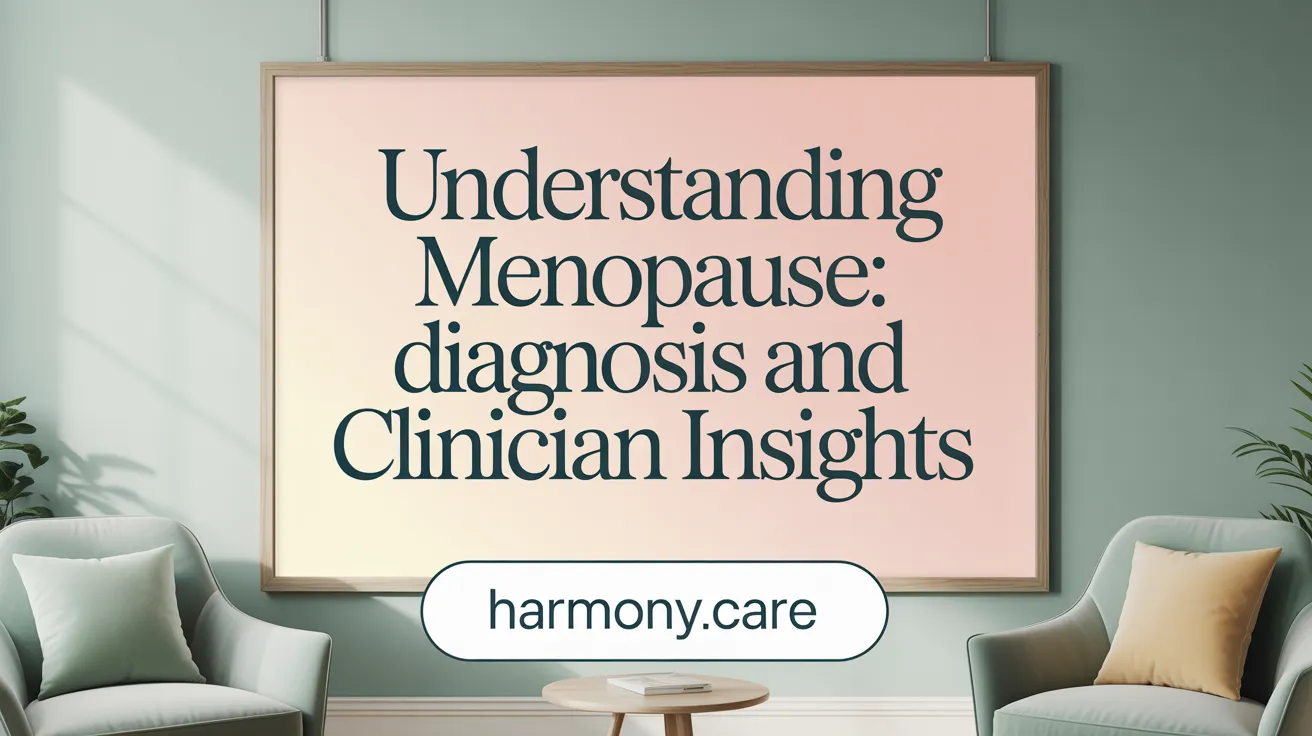Understanding Menopause and Its Complexities
Menopause marks a significant transition in a woman's life, typically occurring between the ages of 45 and 55, characterized by the cessation of menstrual cycles and a natural decline in ovarian hormone production. This phase often brings a constellation of physical and emotional symptoms—hot flashes, night sweats, sleep disturbances, mood swings, vaginal dryness, and cognitive changes, among others—that vary widely in severity and duration. Managing these complex symptoms requires a comprehensive and personalized approach that goes beyond conventional treatments. Integrative medicine, blending traditional medical care with complementary therapies, offers promising avenues to improve quality of life during menopause. This article explores the multifaceted landscape of menopause management through integrative therapies, highlighting evidence-based lifestyle interventions, mind-body practices, natural products, and medical options that together provide a holistic framework for care.
Defining Menopause and the Clinical Approach to Diagnosis

What is menopause and when does it typically occur?
Menopause is the natural end of a woman's reproductive years, marked by the permanent cessation of menstrual cycles. It is retrospectively diagnosed after 12 consecutive months without menstruation. The typical age of onset ranges from 45 to 55 years, with the average age being approximately 51.4 years. This stage reflects a decline in ovarian function, particularly the reduced production of key hormones like estrogen and progesterone (Menopause overview).
How is menopause diagnosed clinically?
Diagnosing menopause primarily relies on clinical observation rather than hormone testing. The main criterion is 12 months of amenorrhea, indicating the cessation of periods. While follicle-stimulating hormone (FSH) levels typically rise during this time, they fluctuate significantly, especially throughout perimenopause, limiting the usefulness of routine hormone assays for diagnosis (diagnosing menopause with blood tests).
Healthcare providers focus on symptom assessment — such as hot flashes, night sweats, and menstrual irregularities — alongside the menstrual history to determine menopausal status (Menopause Symptoms). Hormone tests may be reserved for cases where diagnosis is uncertain or when other conditions need to be ruled out.
This clinical approach ensures a personalized and accurate diagnosis by combining patient history and symptom profiles rather than relying solely on laboratory values, which can vary and be misleading (Menopause diagnosis and FSH levels.
Common Menopausal Symptoms and Their Impact on Quality of Life

What are common symptoms experienced during menopause?
Menopause brings a variety of symptoms stemming from hormonal changes that most women experience between ages 45 and 55. The most prevalent are vasomotor symptoms such as hot flashes and night sweats, affecting over 80% of women. Other common symptoms include vaginal dryness and sexual dysfunction, psychological challenges like anxiety and depression, cognitive issues often described as brain fog, sleep disturbances, and weight gain.
How long and variable are these symptoms?
The severity and duration of symptoms differ widely among individuals. Hot flashes, for example, usually last several minutes and may continue for 5 years or longer, sometimes persisting beyond a decade. Symptom intensity ranges from mild and manageable to severe, significantly impairing daily activities. For details on duration and variability, see menopause symptoms overview.
How do menopausal symptoms affect quality of life?
These symptoms have a profound impact on both physical and mental health. Disrupted sleep from night sweats and hot flashes can lead to fatigue, which increases susceptibility to mood disorders such as anxiety and depression. Vaginal dryness and sexual dysfunction reduce sexual satisfaction and intimacy, contributing further to emotional distress. Cognitive complaints like forgetfulness add to decreased wellbeing. Collectively, these symptoms often prompt women to seek medical or complementary therapies to improve life quality.
Are symptoms interrelated?
Yes, many menopausal symptoms correlate closely. For instance, hot flashes often trigger sleep disturbances, which in turn exacerbate mood problems. This interaction creates a cycle that can worsen overall health and functioning if left unaddressed. More about symptom interactions and management is discussed in complementary and integrative therapies for menopause.
Addressing these symptoms comprehensively through integrative care, lifestyle changes, and appropriate therapies can substantially enhance the wellness and daily functioning of menopausal women.
Hormone Replacement Therapy (HRT): Benefits, Risks, and Considerations

What is hormone replacement therapy and how does it work?
Hormone replacement therapy (HRT) addresses menopause symptoms caused by decreased estrogen and progesterone production. It supplements these hormones to relieve symptoms such as hot flashes, night sweats, vaginal dryness, and mood swings. HRT can be systemic, affecting the whole body, or local, targeting vaginal symptoms specifically. Administration routes include oral pills, skin patches, gels, sprays, vaginal creams, rings, and tablets.
What types of HRT are available and how are they administered?
Women who have had a hysterectomy usually receive estrogen-only therapy. Those with an intact uterus need a combination of estrogen and progestin to prevent endometrial hyperplasia. Common forms of estrogen therapy include:
- Oral tablets
- Transdermal patches or gels
- Vaginal creams, rings, or tablets for localized treatment
See more on Hormone Therapy for Menopause.
How effective is HRT for symptom relief?
HRT is the most effective treatment for managing vasomotor symptoms such as hot flashes and night sweats. It also helps alleviate vaginal dryness and discomfort, improves mood, enhances sleep quality, and reduces the risk of osteoporosis. For detailed information on efficacy and benefits, refer to the Endocrine Society’s menopause treatment overview.
What are the risks associated with hormone therapy?
Although beneficial, HRT carries potential risks:
- Increased risk of breast cancer, especially with combined estrogen-progestin therapy
- Stroke and blood clots
- Heart disease, particularly if started more than 10 years after menopause or in older women
- Gallbladder disease
To mitigate risks, current guidelines recommend using the lowest effective dose for the shortest duration necessary and regular monitoring by healthcare providers. More details on risks and benefits can be found in AFP article on hormone therapy.
How is patient selection and timing important for HRT?
HRT is generally recommended for symptomatic women under 60 years old and within 10 years of menopause onset. Women with high risk of cardiovascular disease, stroke, breast cancer, or blood clots should avoid HRT or use it with caution after thorough medical evaluation. Guidelines on patient selection and timing are discussed in Mayo Clinic menopause treatment.
Are bioidentical hormones safer than conventional HRT?
Bioidentical hormones are chemically identical to natural hormones produced by the body. FDA-approved bioidentical hormone therapies are regulated and proven safe and effective. However, compounded bioidentical hormones lack FDA oversight, leading to variability in dosing and safety concerns. Therefore, they are not recommended as being safer or more natural than conventional HRT. See more in NHS alternatives to HRT.
| Aspect | Details | Notes |
|---|---|---|
| HRT Types | Estrogen-only, combined estrogen-progestin | Depends on uterus status (ACOG) |
| Administration Routes | Oral, patch, gel, spray, vaginal cream, ring, tablet | Route chosen based on symptoms (Cleveland Clinic |
| Benefits | Symptom relief, osteoporosis risk reduction, mood improvement | Most effective for vasomotor symptoms (Endocrine Society) |
| Risks | Breast cancer, stroke, blood clots, heart disease, gallbladder | Risk higher with age and duration (AFP) |
| Patient Selection | Women under 60, within 10 years of menopause | High-risk patients require caution (Mayo Clinic |
| Bioidentical Hormones | FDA-approved are safer; compounded forms are unregulated | Compounded forms not recommended (NHS) |
Non-hormonal Pharmacologic Options for Menopause Symptom Management

What non-hormonal medications are available for menopausal symptoms?
For women who cannot or prefer not to use hormone replacement therapy (HRT), several non-hormonal pharmacologic options are effective for managing menopausal symptoms. These include antidepressants such as selective serotonin reuptake inhibitors (SSRIs) and serotonin-norepinephrine reuptake inhibitors (SNRIs), which help reduce hot flashes and improve mood disturbances. Gabapentin, originally used for epilepsy, has also been shown to alleviate hot flashes, particularly night sweats. Clonidine, a medication commonly prescribed for high blood pressure, can provide some relief from vasomotor symptoms but may cause side effects like dry mouth or dizziness. More recently, the FDA has approved fezolinetant, a neurokinin 3 receptor antagonist, as a targeted treatment for hot flashes.
How effective are non-hormonal treatments compared to hormone therapy?
Although non-hormonal medications are generally less effective than HRT, they offer meaningful relief from vasomotor symptoms and improve the overall quality of life. Their benefit is especially crucial for women with contraindications to hormone therapy, such as those with a history of breast cancer or cardiovascular risks. SSRIs and SNRIs have been found not only to reduce the frequency and severity of hot flashes but also to help with associated mood symptoms. Gabapentin provides notable improvement, especially in sleep disturbed by night sweats. Clonidine’s effectiveness is moderate but limited by its side effects. Fezolinetant represents a newer and promising option with potentially better tolerability and targeted action.
Table: Non-Hormonal Medications for Menopause Symptom Relief
| Medication | Symptom Targeted | Notes on Use and Side Effects |
|---|---|---|
| SSRIs (e.g., paroxetine) | Hot flashes, mood | May cause nausea, fatigue |
| SNRIs (e.g., venlafaxine) | Hot flashes, mood | Possible dizziness, dry mouth |
| Gabapentin | Hot flashes, night sweats | Sedation, dizziness |
| Clonidine | Hot flashes | Side effects may limit use |
| Fezolinetant | Hot flashes | Newer agent, fewer side effects |
Non-hormonal pharmacologic options expand the available tools to provide symptom relief tailored to individual health needs and preferences. Consulting healthcare providers ensures the safest and most effective choice.
Dietary Approaches and Nutritional Supplements in Menopause

What dietary measures support menopausal health?
A well-rounded diet plays an essential role in managing menopause and its associated health risks. Calcium intake is paramount for postmenopausal women to maintain bone density and reduce osteoporosis risk. The recommended daily intake is between 1,000 and 1,200 mg, which can be obtained from calcium-rich foods like low-fat yogurt, cheese, sardines, milk, fortified orange juice, tofu, salmon, and leafy greens such as kale (Calcium intake sources, Diet recommendations during menopause, Calcium and Vitamin D Intake, Calcium intake for bone health).
Vitamin D is critical in enhancing calcium absorption and bone health. Women under 70 are advised to take about 600 IU daily, while those over 70 may require 800 IU or more, especially if at risk of deficiency. The vitamin D can be sourced from fatty fish, eggs, fortified foods, and supplements (Vitamin D supplementation, Vitamin D benefits during menopause, Vitamin D and calcium for menopause).
Omega-3 fatty acids contribute significantly to cardiovascular health and may also benefit bone density. Found in fatty fish (like salmon and mackerel), walnuts, flaxseed, and green leafy vegetables, these fats are recommended as part of the regular diet. A typical guideline suggests two servings of fatty fish per week, with higher doses considered for those at risk of heart disease (Omega-3 fatty acids benefits, Dietary practices for menopausal symptom relief, Fish oil for cardiac event prevention, Omega-3 fatty acids and menopause.
Do phytoestrogens help with menopausal symptoms?
Phytoestrogens are plant-based compounds with estrogen-like activity, widely studied for their potential to alleviate menopausal symptoms. Common sources include soy products (tofu, soy milk), flaxseed, and red clover. These compounds may modestly reduce vasomotor symptoms such as hot flashes and improve vaginal dryness in some women. However, the effectiveness varies due to differences in individual gut flora that metabolize these compounds, and current research presents mixed results (Phytoestrogens and menopause, Soy isoflavones and red clover benefits, Soy and Phytoestrogens, Phytoestrogens and hot flash relief.
Dietary recommendations and supplement considerations
Beyond calcium, vitamin D, and omega-3s, a diet abundant in whole, unprocessed foods, rich in fruits, vegetables, and dietary fiber, supports overall menopausal health. Reducing intake of triggers like caffeine, alcohol, and spicy foods may help in managing hot flashes. While supplements of phytoestrogens are popular, their variable efficacy and safety profiles underscore the importance of consulting healthcare providers before use (Dietary recommendations during menopause, Diet and Menopause, Consulting healthcare professionals for menopause supplements.
In summary, a dietary pattern emphasizing calcium and vitamin D intake, regular consumption of omega-3 fatty acids, and incorporating phytoestrogen-rich foods can support bone and cardiovascular health and may ease menopausal symptoms. However, the response to phytoestrogens is individual, and supplements should be used prudently under professional guidance (Diet recommendations during menopause, Phytoestrogens and menopause, Herbal Supplements for Menopause).
Physical Activity and Exercise as Cornerstones of Menopause Management

What types of physical activity are recommended during menopause?
Moderate exercise for at least 30 minutes on most days is advised for menopausal women. This includes a combination of muscle-strengthening and weight-bearing activities to support bone health. Aerobic exercises such as walking or biking boost cardiovascular health. Mind-body practices like yoga and tai chi not only improve physical fitness but also aid in mental well-being.
How does exercise help manage menopausal symptoms?
Exercise offers multiple benefits for managing menopausal symptoms. It helps reduce the severity of hot flashes and night sweats, although research on this is mixed. More consistently, exercise improves sleep quality and helps relieve mood disturbances such as anxiety and depression. It also combats stress and helps maintain healthy body weight and muscle mass, both crucial for overall well-being during menopause (source).
Benefits for bone density, cardiovascular health, mood, and symptom relief
Weight-bearing and resistance exercises promote bone density, reducing the risk of osteoporosis, a common postmenopausal concern. Regular aerobic activity supports heart health, which is especially important since menopause increases cardiovascular risk. Exercise releases endorphins that uplift mood and reduce stress. Collectively, these benefits enhance quality of life during menopause (source.
Exercise impact on vasomotor symptoms and sleep
While the evidence on exercise directly reducing vasomotor symptoms like hot flashes is somewhat inconclusive, many women report symptom relief. Exercise’s positive effect on sleep is well documented and is critical since menopausal women frequently experience sleep disturbances worsened by hot flashes and night sweats. Improved sleep then supports better mood and energy (source).
In summary, incorporating moderate, regular physical activity—including muscle strengthening, cardio, and mind-body fitness—plays a vital role in menopause symptom management and long-term health.
| Exercise Type | Benefit Area | Additional Notes |
|---|---|---|
| Weight-bearing & resistance | Bone health | Prevents osteoporosis |
| Aerobic (walking, biking) | Cardiovascular health | Enhances heart function and endurance |
| Yoga & Tai chi | Mood and stress management | Supports relaxation and mental well-being (source) |
| General moderate exercise | Symptom relief, sleep quality | May reduce hot flash severity and improve sleep (source |
Mind-Body-Spirit Therapies: Yoga, Meditation, Tai Chi, and Hypnotherapy

Overview of mind-body approaches and their benefits
Mind-body therapies such as yoga and tai chi for menopause symptoms, mindfulness meditation, and hypnotherapy are widely used to manage menopause symptoms. These practices work by engaging physical movement, breathing, and focused attention to balance the nervous system and promote relaxation. They provide non-pharmacological support for symptoms like hot flashes, mood disturbances, and sleep difficulties.
Evidence for symptom relief especially hot flashes, mood, and sleep
Among these therapies, hypnotherapy has shown particularly strong evidence, with studies reporting a clinically significant reduction in hot flash severity and frequency, often greater than 50%, comparable to some medication effects. Yoga and tai chi contribute to improving mood and reducing menopause-related fatigue, while mindfulness meditation supports better sleep quality. Though evidence varies in strength, the holistic benefits of these interventions make them valuable components of menopause management.
Role in stress management and emotional well-being
Mind-body practices effectively reduce anxiety and depression by fostering relaxation and enhancing coping mechanisms during the challenging menopausal transition. Techniques like breathing exercises and meditation calm the nervous system, helping women to manage stress and emotional fluctuations. The resultant improvement in psychological well-being complements physical symptom relief.
Incorporation into integrative menopause care
Integrative menopause care blends conventional treatments with these mind-body-spirit approaches, encouraging their use as adjunct therapies. Programs often recommend moderate exercise inclusive of yoga or tai chi alongside lifestyle measures to support bone and cardiovascular health. Hypnotherapy is gaining recognition as a potent tool for vasomotor symptoms. Overall, incorporating these therapies provides a personalized, comprehensive plan addressing both physical and emotional aspects of menopause.
Complementary Therapies: Acupuncture, Massage, and Traditional Chinese Medicine

What evidence supports acupuncture and massage for menopause?
Acupuncture is gaining attention as a complementary therapy for managing menopausal symptoms, particularly vasomotor symptoms like hot flashes and sleep disturbances. Studies show mixed but encouraging results; some women experience significant reductions in the frequency and severity of hot flashes and improvement in mood. For more details, see Complementary and Alternative Medicine for Menopause and Managing Menopause: How Integrative Care Can Help.
The benefits are believed to come through acupuncture’s ability to modulate the nervous system, decrease inflammation, and promote relaxation. However, evidence varies between studies, and placebo effects cannot be completely ruled out. More rigorous, well-designed research is needed to confirm these benefits and clarify protocols. See Complementary therapies overview and Acupuncture for menopausal symptoms.
Massage therapy is recognized for its role in symptom relief through increasing blood flow, reducing muscle tension and pain, and enhancing relaxation. This can reduce physical discomfort and stress levels commonly experienced during menopause, supporting emotional well-being (Managing Menopause: How Integrative Care Can Help.
How is Traditional Chinese Medicine (TCM) used in menopause care?
Traditional Chinese Medicine offers a holistic and integrative approach to menopause management. It incorporates several modalities:
- Herbal remedies and teas: tailored to individual symptoms and constitution (Herbal remedies for menopause
- Acupuncture: to regulate body energy (Qi), improve circulation, and soothe symptoms (Acupuncture and menopausal symptoms
- Dietary counseling: emphasizing foods that nourish balance and support hormonal health (Diet recommendations during menopause
- Stress management and lifestyle advice: including sleep hygiene and gentle movement (e.g., tai chi) (Yoga and tai chi for menopause symptoms
This comprehensive framework aims to restore energy balance and harmonize the body's systems rather than solely targeting isolated symptoms. TCM is commonly integrated with conventional biomedical care in specialized menopause programs to offer personalized and multifaceted treatment (Integrative Menopause Management, UCLA Center for East-West Medicine.
Safety and research considerations
While generally considered safe when performed by licensed practitioners, acupuncture and herbal treatments may have risks such as infections, allergic reactions, or herb-drug interactions (Herbal remedies safety.
Massage therapy is low risk but should be adapted to individual health status (Massage Therapy Benefits.
Given the variability in study designs and outcomes, further high-quality research is essential to better understand the effectiveness, optimal treatment regimens, and long-term safety of these complementary therapies in menopause care. Healthcare providers should guide patients on appropriate use within a coordinated care plan to maximize benefits and minimize risks (Complementary and Alternative Medicine for Menopause, Menopause Treatment and Management.
Herbal and Botanical Supplements: Benefits, Risks, and Evidence

Which herbal supplements are commonly used for menopausal symptoms?
Several herbal and botanical supplements are popular among women seeking relief from menopausal symptoms. The most commonly used include black cohosh, red clover, soy isoflavones, flaxseed, maca, and St. John's Wort. Black cohosh is traditionally used to reduce hot flashes and night sweats and may also have a mild blood pressure–lowering effect. Red clover and soy contain phytoestrogens—plant compounds that mimic estrogen's action—which can modestly improve vasomotor symptoms such as hot flashes and vaginal dryness. Flaxseed contains omega-3 fatty acids and lignans with potential phytoestrogenic effects. Maca and St. John’s Wort are sometimes used for mood and energy support, though evidence varies.
What are the mechanisms of action and symptom-specific effects?
Black cohosh is thought to act on neurotransmitter pathways without directly influencing estrogen receptors, which may explain its effects on hot flashes. Phytoestrogens in red clover and soy bind estrogen receptors weakly, potentially easing vasomotor symptoms. Flaxseed's lignans and omega-3s may contribute to anti-inflammatory and cardiovascular benefits, while maca is proposed to support mood and sexual function. St. John’s Wort primarily interacts with neurotransmitters affecting depression and anxiety rather than vasomotor symptoms.
What are safety considerations with herbal therapies?
Herbal supplements are not regulated as strictly as pharmaceuticals, which leads to variability in purity, dosage, and product quality. Some herbs, notably St. John’s Wort, can interact seriously with prescription medications by affecting drug metabolism. Black cohosh may rarely cause liver inflammation, warranting liver function monitoring during prolonged use. Red clover and soy supplements should be used cautiously in women with hormone-sensitive conditions. Because of these safety concerns, women are strongly advised to consult healthcare providers before starting any herbal supplements to ensure safe integration with other treatments (NHS herbal remedies and complementary medicines, PMC on CAM and menopause.
What are the limitations of current scientific evidence?
Scientific studies on herbal supplements for menopause are often limited by small sample sizes, inconsistent study designs, and varying product formulations. Evidence supporting efficacy is mixed: black cohosh and phytoestrogens show modest benefits but lack robust, consistent high-quality clinical trials. Safety data remain insufficient, and long-term effects are unclear. Overall, while some women find symptom relief with herbal supplements, their use must be individualized with professional guidance, and more rigorous research is needed to establish firm conclusions (PMC article on CAM therapy evidence, NHS herbal medicine safety.
Lifestyle Modifications and Stress Management for Holistic Menopause Care

How do lifestyle factors influence menopause symptoms?
Lifestyle choices can significantly affect menopausal symptoms. Avoiding tobacco use is crucial, as smoking may exacerbate hot flashes and increase cardiovascular risks during menopause. Limiting alcohol and caffeine intake helps reduce the frequency and severity of hot flashes and night sweats, as these substances can act as triggers. Additionally, identifying and avoiding particular dietary triggers, such as spicy foods, may ease discomfort (Diet recommendations during menopause, Foods to avoid during menopause.
Implementing good sleep hygiene practices is essential for managing sleep disturbances common in menopause. This includes maintaining a consistent sleep schedule, creating a comfortable sleep environment, and dressing in layers to manage night sweats effectively. Using fans or keeping the bedroom cool can also enhance sleep quality (Sleep Problems in Menopause, menopausal sleep disturbances and treatments.
What stress management and social supports aid menopause?
Stress reduction plays a vital role in holistic menopause care. Techniques such as mindfulness meditation, relaxation practices, and breathing exercises help regulate the nervous system, reducing anxiety and improving overall emotional well-being. These practices also contribute to lowering the intensity of menopausal symptoms like hot flashes and mood swings (Mind-body practices, Mind-body therapies effectiveness).
Engagement in spiritual activities and cultivating connections within supportive communities provide important emotional and psychological benefits. Connecting with experienced women, spiritual mentors, or participating in group activities can foster a sense of belonging and resilience. Such social support networks alleviate feelings of isolation and enhance coping during this life transition (Spiritual support during menopause, Integrative Health for Menopause.
Overall, an integrative approach that combines lifestyle modifications with stress management techniques and social engagement offers comprehensive support for women navigating menopause (Managing Menopause: How Integrative Care Can Help.
The Integrative Medicine Model: Personalized and Comprehensive Menopause Care

What is integrative medicine in the context of menopause?
Integrative medicine for menopause combines conventional biomedical treatments with evidence-based complementary therapies. These therapies include mind-body practices (like yoga, tai chi, and mindfulness, nutritional support, acupuncture, and herbal medicine. The goal is to thoughtfully address the full spectrum of menopause symptoms—physical changes, emotional well-being, and spiritual health—creating a holistic care model (Integrative Health for Menopause.
How is integrative menopause care delivered?
Delivering integrative menopause care involves interdisciplinary healthcare teams. These often comprise internal and family medicine physicians, integrative medicine specialists, acupuncturists, nutritionists, and mental health providers. Together, they develop personalized treatment plans that prioritize patient preferences and safety, carefully balancing conventional therapies like hormone replacement with complementary approaches (Comprehensive Menopause Care, Managing Menopause: How Integrative Care Can Help.
Examples of integrative programs and resources
One prominent example is the UCLA Menopause Program, which partners with the UCLA Center for East-West Medicine. This program blends biomedicine with traditional Chinese medicine, offering lifestyle counseling, dietary guidance, stress management, herbal therapies, and acupuncture. Patients benefit from a patient-centered, individualized approach addressing chronic conditions alongside menopause symptoms (UCLA Comprehensive Menopause Program, Integrative Medicine for Menopause.
Role of patient-centered treatment planning
Integral to integrative care is individualized treatment planning. Providers assess symptoms, medical history, and patient values, then personalize therapies accordingly. This comprehensive method ensures that management strategies not only mitigate symptoms but also improve overall quality of life and emotional support during menopause (An Integrative Medicine Approach to Managing Menopause Symptoms, Complementary and Alternative Medicine for Menopause.
In summary, integrative medicine creates a tailored, comprehensive approach combining the best of conventional and complementary care, supported by collaborative healthcare teams and evolving programs designed to meet the complex needs of women during menopause (Integrative Menopause Management, Managing Menopause: How Integrative Care Can Help.
Embracing Integrative Therapies for Empowered Menopause Management
Menopause is a complex, multifaceted phase requiring personalized and comprehensive care that considers biological, psychological, and social dimensions. Integrative therapies—ranging from hormone replacement and non-hormonal medications to dietary strategies, physical activity, mind-body practices, acupuncture, and herbal supplements—offer diverse tools to tailor management for individual needs. While hormone therapy remains the most potent treatment for vasomotor symptoms, many women benefit from integrative approaches that minimize risks and enhance overall wellness. Collaborative care involving informed healthcare providers and empowered patients facilitates safe, effective symptom relief and fosters resilience during this life transition. As research advances and awareness grows, integrative medicine stands poised to redefine menopause management, supporting women in achieving vitality and quality of life well beyond midlife.
